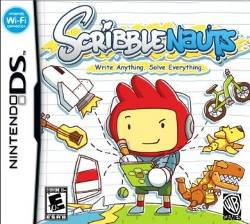
Admit it: when you first heard that someone was developing a game that required you to write the names of objects and then use those objects to solve puzzles, you rolled your eyes. You figured that the premise would be executed in a very bland and limited fashion - I mean it would have to be in order to fit it all into one game, right? That's how I felt, too. However, Scribblenauts is exactly the game that 5th Cell promised.
Players control Maxwell, a little dude with a rooster-like hat. There's no story to the game at all. You're simply making your way through ten different "worlds" (castle, forest, etc.) that each contain about a dozen completely unrelated scenarios. Every scenario has a different problem for Maxwell to solve, such as rescuing a cat from the roof of a house or stopping ants from eating picnic food. You solve these problems by clicking the notepad at the top right of the screen, tapping out the name of an object you want to summon, and then using said object. While some scenarios will only require one object to complete - you can get the cat off the roof by climbing up with a ladder and picking her up - before long you'll need to use a string of different tools, animals, and characters to save the day. In some cases you'll also connect objects (with rope, glue, and so forth) to solve really tricky situations. After you complete your objective, a little star (or "Starite") will appear and you grab it to complete the mission.
The only stated limits to the game's notepad is that you can only summon tangible objects and they can't be copyrighted or lewd words. I've read elsewhere that the dictionary for the game is a few thousand words in all and I can believe it. I've summoned robots, jet packs, manticores, stealth bombers, fig trees, and - well, I can't think of many cases where the game didn't humor me. Granted, there's a bit of overlap there; writing "sniper rifle" and "rifle" will summon the same object. It will definitely test the limits of your imagination. When you type in a word that may have more than one interpretation, you'll be prompted to choose from a list. For example, type in "sub" and the game will ask you whether you want a submarine, a sandwich, or a sub-woofer.
Scribblenauts is an example of emergent gameplay, which Wikipedia definies as "complex situations in a video game that emerge from the interaction of relatively simple game mechanics." You'll need to experiment a bit at the outset but you can, relatively early in the game, discover a small set of objects that work with the majority of puzzles. For example, I ended up using ghosts and air vents a lot. Also, you can often find stupidly simple, almost broken ways to finish challenges. There was one level where you were asked to get an omelette for a caveman. A nearby dinosaur was guarding an egg and the conventional way to beat this challenge was to steal the egg and then put it over a fire to cook it for the caveman. After a few failed attempts at this, though, I simply typed in "omelette" in the notepad and handed it to the caveman. It worked.
I'd feel bad about subverting missions like this but I always felt like it was payback for sum of the arbitrary parameters of missions. Why, for example, does scaring off a bully with a ghost cause me to fail the challenge? I don't remember being told not to do that. It would've been nicer if the conditions for a given scenario were outlined more clearly. Furthermore, it's baffling that I'm not allowed to read over the objective again after I've begun the level. Not knowing the exact rules governing a given level can often make me feel like I've just glitched my way through a level instead of legitimately completing it.
The fun part of Scribblenauts is devising really exotic or clever ways to solve each level. When asked to clear bugs from a garden, I summoned a dam and dropped it on them. Laughed like crazy while I was doing it, too. This game requires you to meet it halfway and become a creative collaborator. You're given encouragement to be inventive, as well. Completing each level earns you "ollars," a currency that is spent to unlock additional worlds and extras such as new avatars for Maxwell. The exact ollar reward depends on how many objects you use (the fewer, the better) and how quickly you finish the level. You also get additional ollars for "style" and merit badges for certain achievements (finishing a level without using weapons, using more than one animal in a level, and so forth). Once you've completed a puzzle once, you can retry it with a new twist - you'll need to complete it three times in a row, without reusing any objects in your consecutive attempts. You can still sort of cheat on this, by using two basically identical items with different names ("dagger" instead of "knife", for example) but why bother? The whole point of the game is experimentation. It's where all of the fun comes from.
The issues with Scribblenauts begin when it comes time to manipulate these objects you've dreamed up. The game is controlled almost entirely with the stylus. You'll only use the arrow buttons to move the camera around, so that you can survey the level and drop objects in areas far away from Maxwell. You'll click on an object and then drag it into place. You can also drag an item onto a character to make them equip it. The problem is that Maxwell's movement and actions are also controlled with the stylus. The poor guy often leaps off cliffs because I accidentally clicked on empty space near an object I was trying to move. When you scroll the camera to move some faraway object, it has a tendency to abruptly snap back to Maxwell without warning. As the camera starts to move, I end up missing the object I was about to click, tapping empty air and, yep, Maxwell takes another leap of death. These moments made me wish I was playing this game on the PC; it would've been nice to have Maxwell and object manipulation handled by two separate mouse buttons.
Your Daily Blend of Entertainment News
Even when you want to control Maxwell, it's a difficult task. He never moves as quickly as you want him to and you never feel as though you have exact control over where he runs/flies/swims. When you're completing the puzzle levels, most of the objectives can be solved entirely with objects so his awkward motion isn't a big issue but it is when you're doing the action levels. The action levels are an entirely different set of challenges that require you to grab the Starite, usually located in some hard-to-reach spot. While you'll still use your notepad to summon useful items and characters, the action scenarios are a bit like platformers and you need some measure of dexterity to complete them by dodging falling objects and all that. Maxwell just really isn't up to snuff for this kind of challenge. Shame, too, because there's as many action challenges as puzzles in the game. As I said before, though, you purchase new worlds by earning ollars so you don't need to complete every action/puzzle level in each world to get to the next one.
Scribblenauts demands a lot from its players. The entertainment value really depends on your willingness to match 5th Cell's inventiveness with your own. Its controls aren't really suited for the occasional action and platforming so you'll need to be patient, too. If you approach the game with these things in mind, you'll find an experience completely unlike anything else on the market. It's a game you could be playing for quite a while too, as it includes a level editor so you can create your own challenge and share them through Wi-Fi. Instead of entertaining you for a few hours, Scribblenauts gives you the ability to entertain yourself for as long as you like.
Players: 1 Player
Platform(s):DS
Developer: 5th Cell
Publisher: Warner Bros. Interactive
ESRB: Everyone
Rating:

Staff Writer at CinemaBlend.

